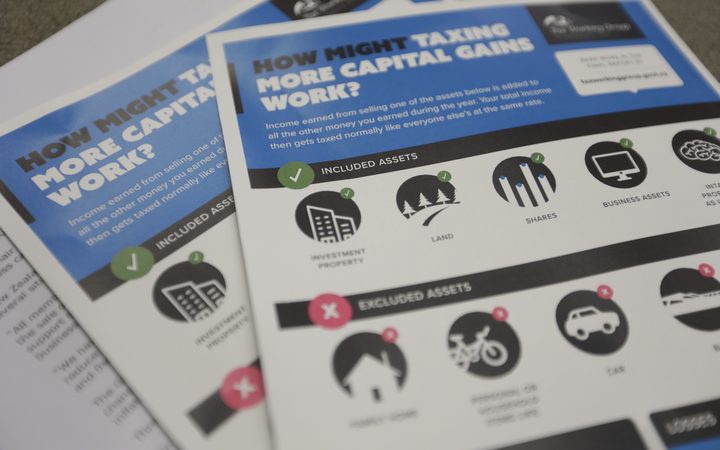Capital gains tax: 'New Zealand is joining the modern world' - academic
Matthew Theunissen, Reporter
If New Zealand introduces a capital gains tax, as has been recommended by the government's Tax Working Group, it would bring us in line with most other countries.

Papers at the release of the Tax Working Group recommendations. Photo: RNZ / Rebekah Parsons-King
So what sort of impact does a capital gains tax have in other parts of the world?
RNZ spoke to academics from Australia, Canada and the UK. All said it was no longer controversial and had become an accepted part of their taxation systems.
Aussies have been taxed on their capital gains from assets like property, shares and leases since 1985.
University of New South Wales tax professor Chris Evans said the debate that's raging here at the moment was one Australia resolved long ago.
"It was a political hot potato, no doubt. But people got used to it and it settled down quite quickly," he said.
Mr Evans, who did some research for New Zealand's Tax Working Group, said any fair and sustainable tax system needed to include a capital gains tax.
"New Zealand's an outlier on this, it's quite surprising. If you look at the 35 countries that are currently in the OECD, New Zealand's the only one without."
And, he said, this country had the opportunity to avoid some of the mistakes made by Australia.
"New Zealand has been far more sensible, in the sense that it's going to treat capital gains just like it treats any other form of income, and so you won't get that complexity of trying to drive a wedge between what's a capital gain as opposed to a revenue gain and all those sorts of problems."
In Canada, a capital gains tax was introduced in 1972, with the tagline "a buck's a buck, a dollar's a dollar".
University of Montreal economics professor François Vaillancourt said concerns around what a capital gains tax could mean for business and property owners have been mitigated in Canada.
"We have a $1 million exemption for small businesses, farmers and fishers. The idea is that a farmer doesn't do much in terms of, say, formal saving plans for retirement but their farm goes up in value and they sell the farm and they make their money that way but then they get taxed on that.
"So it's not as easy for them to accumulate savings for retirement. That's why we have an exemption for these people."
The rates and some of the technicalities of Canada's capital gains tax have changed over the years, but Mr Vaillancourt said it wasn't really a political issue these days.
"In a sense - with all due respect - New Zealand is joining the modern world, tax-wise."
In Britain, a capital gains tax was introduced in 1965 alongside a corporation tax.
University of Birmingham tax professor Andy Lymer said relatively few people pay the tax - about 250,000 a year out of a population of some 66 million.
This year it was expected the government would collect £9.9 billion, or $NZ19 billion.
Mr Lymer was sympathetic to concerns about the complexities of implementing and maintaining a capital gains tax.
"It's there as a key equity balancing tool that balances out between those that are engaging in active income generation through labour as opposed to more passive investment returns through capital gains tax. Therefore, in my opinion, the cost is worth it.
"Provided it's covering its cost, at least it's achieving that equity balance."
As in most countries, the family home is exempt from the tax in the UK and there other exemptions for businesses.
"I would be very surprised if many people in the UK would argue that a capital gains tax should be done away with," Mr Lymer said.
"There's a little debate every now and again about exemptions for homes. We get a bit of debate periodically about entrepreneurs relief - is it too generous? But it's about levels of generosity, not that it shouldn't be there."
The government's full response to the Tax Working Group's recommendations, including any planned new taxes, is expected in April.



 Eugene Doyle: Before It’s Too Late - Reimagine New Zealand’s Military Future
Eugene Doyle: Before It’s Too Late - Reimagine New Zealand’s Military Future  Binoy Kampmark: Gender Stunts In Space - Blue Origin’s Female Celebrity Envoys
Binoy Kampmark: Gender Stunts In Space - Blue Origin’s Female Celebrity Envoys Richard S. Ehrlich: A Deadly Earthquake & Chinese Construction
Richard S. Ehrlich: A Deadly Earthquake & Chinese Construction Ian Powell: It Does Matter To Patients Whether They Are Operated In A Public Or Private Hospital
Ian Powell: It Does Matter To Patients Whether They Are Operated In A Public Or Private Hospital Gordon Campbell: On Marketing The Military Threat Posed By China
Gordon Campbell: On Marketing The Military Threat Posed By China Binoy Kampmark: Olfactive Implications - Perfume, Power And Emmanuel Macron
Binoy Kampmark: Olfactive Implications - Perfume, Power And Emmanuel Macron